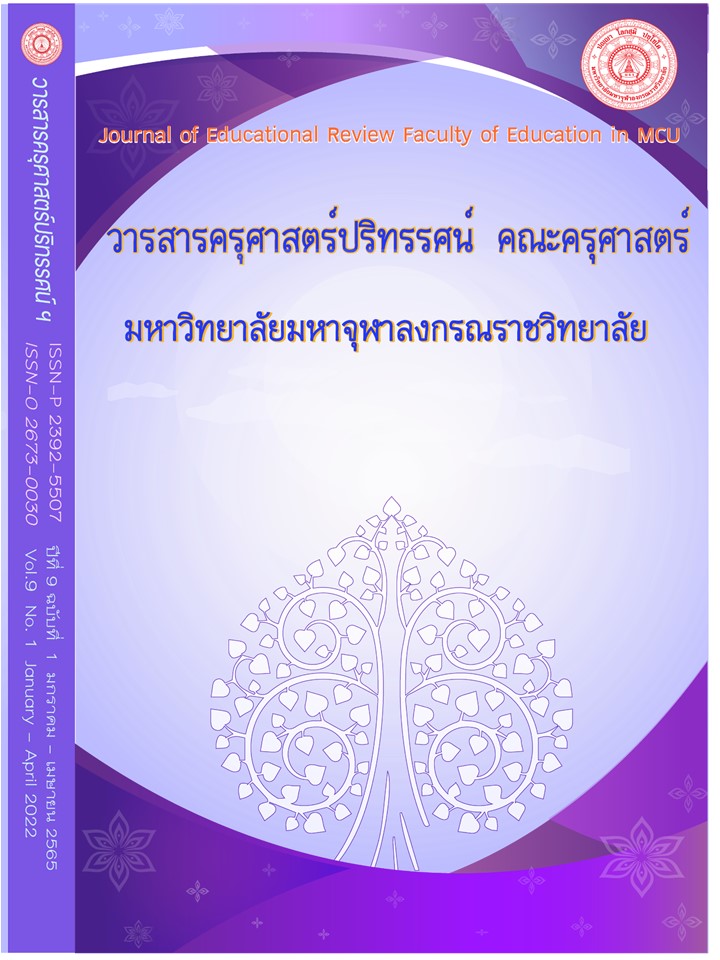THE STUDY OF COMPONENTS AND NECESSITIES OF MEASURING AND EVALUATING LEARNING OUTCOMES FOR BASIC EDUCATION INSTITUTIONS
Main Article Content
Abstract
The objective of this research was to study the composition and the need for measurement and evaluation. For basic education institutions the sample group was teachers 8 groups of learning subjects. Categorized by Basic Education Core Curriculum, BE 2551. These include Thai language, mathematics, social studies, religion and culture, science, health and physical education, arts, work, career and technology. And foreign languages of 256 people by Purposive Sampling. The research tool was a responsive evaluation questionnaire that identified teachers' needs. Analyze quantitative data using Basic statistics T-value test Analysis of two-way variance and using the Modified Priority Needs Index technique. To prioritize needs is necessary. And analyzing the quality of the data by using content analysis based on work experience with the following research results. 1) The teachers at the basic education level have a need. To develop the ability to measure and evaluate learning outcomes in the field of design, measurement and evaluation of learning and building tools as possible. Followed by the measure and Evaluate learning outcomes and the aspect of scoring, reporting of results and applying the results, respectively. 2) The reason for the highest demand for measuring and evaluating learning outcomes is that teachers lack knowledge and skills. Measurement and evaluation skills. The results of the study, the composition and necessity of learning measurement and evaluation. For a basic education institution, it consists of 3 main components as follows. 1) In the design, measurement and evaluation to promote learning management, tool construction, it was found that the group of teachers teaching the cognitive content had more performance in the measurement and evaluation than the teachers who taught the character content of the cognitive skills. 2) In conducting the measurement and evaluation, it was found that the group of teachers teaching the cognitive content characteristics had more performance in the measurement and evaluation] than the teachers who taught the character traits of the cognitive skills. and 3) On scoring, reporting and applying the results, it was found that the group of teachers teaching the cognitive content had a working condition in the measurement and evaluation to promote learning management. Rather than a group of teachers who teach the nature, content, and skills.
Article Details

This work is licensed under a Creative Commons Attribution-NonCommercial-NoDerivatives 4.0 International License.
ทัศนะและความคิดเห็นที่ปรากฏในบทความในวารสารฉบับนี้ถือเป็นความรับผิดชอบของผู้เขียนบทความนั้นเพียงผู้เดียว และไม่ถือเป็นทัศนะและความรับผิดชอบของกองบรรณาธิการ
กองบรรณาธิการขอสงวนสิทธิ์ในการคัดเลือกบทความลงตีพิมพ์และจะแจ้งให้เจ้าของบทความทราบหลังจากผู้ประเมินบทความตรวจอ่านบทความแล้ว
ต้นฉบับที่ได้รับการตีพิมพ์ในวารสารครุศาสตร์ปริทรรศน์ คณะครุศาสตร์ มหาวิทยาลัยมหาจุฬาลงกรณราชวิทยาลัย ถือเป็นกรรมสิทธิ์ของคณะครุศาสตร์ มหาวิทยาลัยมหาจุฬาลงกรณราชวิทยาลัย ห้ามนำข้อความทั้งหมดหรือบางส่วนไปพิมพ์ซ้ำ เว้นเสียแต่ว่าจะได้รับอนุญาตจากมหาวิทยาลัยฯ เป็นลายลักษณ์อักษร
References
กรมวิชาการ กระทรวงศึกษาธิการ. (2542). การประเมินผลจากสภาพจริง. กรุงเทพมหานคร: โรงพิมพ์คุรุสภาลาดพร้าว.
กรมวิชาการ กระทรวงศึกษาธิการ. (2545). พระราชบัญญัติการปฏิรูปการศึกษา พ.ศ. 2542. กรุงเทพมหานคร: โรงพิมพ์คุรุสภาลาดพร้าว.
กรมวิชาการ กระทรวงศึกษาธิการ. (2551). แนวทางการวัดและประเมินผลการเรียนตามหลักสูตรการศึกษาขั้นพื้นฐานพุทธศักราช 2551. กรุงเทพมหานคร: โรงพิมพ์คุรุสภาลาดพร้าว.
กระทรวงศึกษาธิการ. (2551). หลักสูตรการศึกษาขั้นพื้นฐาน พุทธศักราช 2551 (ปรับปรุง 2560). กรุงเทพมหานคร: โรงพิมพ์องค์การรับส่งสินค้าและพัสดุภัณฑ์.
นงลักษณ์ วิรัชชัย. (2555). วิธีการที่ถูกต้องและทันสมัยในการกำหนดขนาดตัวอย่าง. แหล่งที่มา http://Ulskill.com/web/files/GPower.pdf. สืบค้นเมื่อ 25 พ.ค. 2563.
นงลักษณ์ วิวัช,ชัย. (2545). กระบวนการปฏิรูปเพื่อพัฒนาคุณภาพการเรียนรู้: การประเมินและการประกัน. กรุงเทพมหานคร: วิทีซีคอมมิวนิเคชั่น.
สาธินี ผ่องอักษร, เสาวนีย์ สิกขาบัณฑิต และพีรพงษ์ สิทธิอมร. (2561). รูปแบบการจัดการคุณภาพของการจัดการศึกษาระดับขั้นพื้นฐานเพื่อพัฒนาสู่มาตรฐานสากล. วารสารวิชาการ มหาวิทยาลัยนอร์ทกรุงเทพ. 7(2). 198-212.
สำนักงานเลขาธิการคุรุสภา. (2556). ข้อบังคับคุรุสภาว่าด้วยมาตรฐานวิชาชีพและจรรยาบรรณของวิชาชีพ พ.ศ. 2548. กรุงเทพมหานคร: โรงพิมพ์คุรุสภาลาดพร้าว.
สำนักวิชาการและมาตรฐานการศึกษา. (2551). เอกสารประกอบหลักสูตรแกนกลางการศึกษาขั้นพื้นฐานพุทธศักราช 2551: แนวปฏิบัติการวัดและประเมินผลการเรียนรู้. กรุงเทพมหานคร: โรงพิมพ์ชุมนุมสหกรณ์การเกษตรแห่งประเทศไทย.
Jiraro, p. (2014). A Development of Measurement and Evaluation Standards and Item Bank Approach Model for Teachers in Thai Secondary Schools. Procedia- Social and Behavioral Sciences. 116. 547-556.
Junpeng, P, Inprasitha, M., & Wilson, M. (2018). Modelling of the Open-ended Items for Assessing Multiple Proficiencies in Mathematical Problem Solving. The Turkish Online Journal of Educational Technology (TOJET). 17 (Special Issue).
Junpeng. P. (2012). The Development of Classroom Assessment System in Mathematics for Basic Education of Thailand. Procedia - Social and Behavioral Sciences. 69(24). 1965-1972.
Ololube, N. p. (2008). Evaluation competencies of professional and non-professional teachers in Nigeria. Studies in educational evaluation. 34(1). 44-51.
Suknaisith, A., Wongwanich, & Piromsombat, C. (2014). Development of Teacher Performance in Educational Measurements and Evaluation through Self¬monitoring Strategies. Procedia-Social and Behavioral Sciences. 116. 1683-1688.


